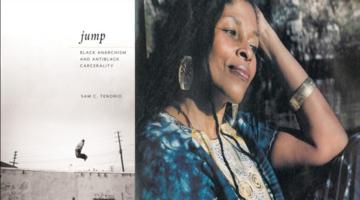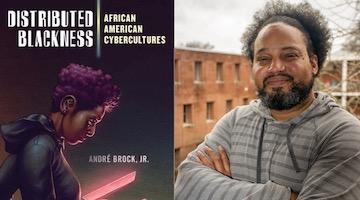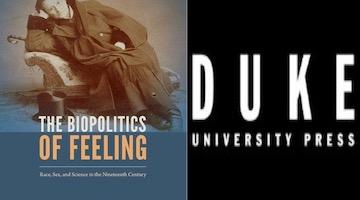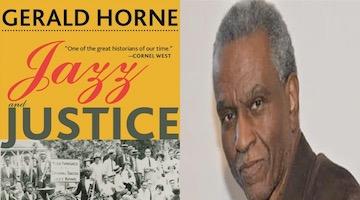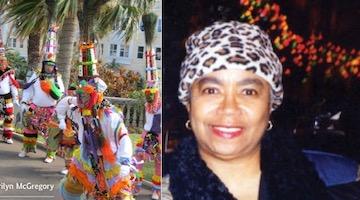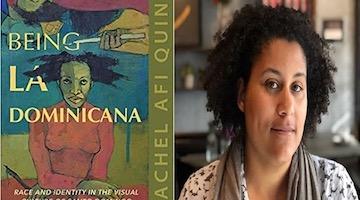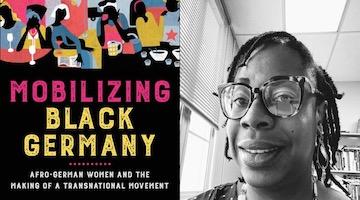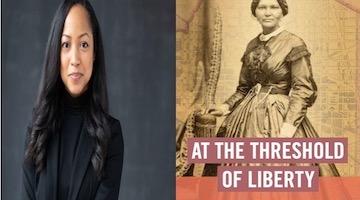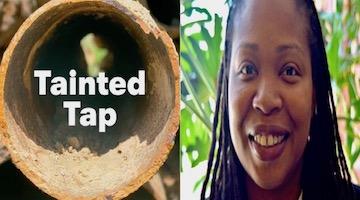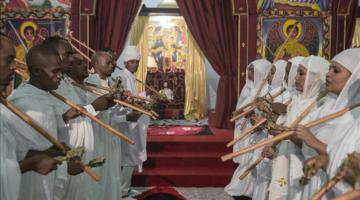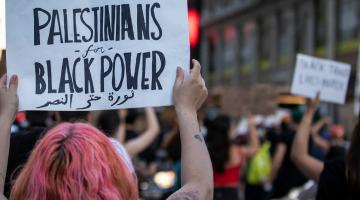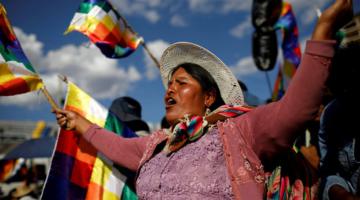Black abolition and Native decolonization have the unique capacity to end the “conquistador settler U.S. nation” and make way for something else.
“The term ‘settler colonialism’ is too polite and tepid for the kind of brutal and quotidian violence that Indigenous and Black people in the US and Canada experience.”
In this series, we ask acclaimed authors to answer five questions about their book. This week’s featured author is Tiffany Lethabo King. King is Assistant Professor of Women's, Gender, and Sexuality Studies at Georgia State University.Her book is The Black Shoals: Offshore Formations of Black and Native Studies.
Roberto Sirvent: How can your book help BAR readers understand the current political and social climate?
Tiffany King: In June, many of us witnessed the U.S Congressional Hearings on Reparations and just a couple weeks ago, many of us tuned in to coverage of the first Native American Presidential Forum. Mainstream U.S. political discourse attempts on the one hand to absorb Black and Native people into the American project —as a voting bloc—while also sequestering them from one another. The current social and political climate attempts to make these kinds of Black and Native negotiations with a violent and genocidal state seem civil, progressive and the only kind of Black and Indigenous politics imaginable. These forms of political theater have a way of polishing up or really spit shining the grotesque act of forcing Black and Indigenous people to bargain with a state that intends to kill them.
I really appreciate that I was writing The Black Shoals in the wake of the Black Lives Matter and NODAPL movements. In the book, I wanted to celebrate the fact that Black abolition and Native decolonization are projects that have the unique capacity to end what I call the “conquistador settler U.S. nation” and make way for something else, something beautiful. More than anything, I want readers to understand the connections between these insurgencies and the transformative capacity that they each contain.
In the book, I attempt to trace the connective tissue that brings Black and Native struggle in the Americas together. Throughout the book, I use the shoal—a land/sea formation—as a meeting place for Black and Native politics, art and activism. Exploring the ways that Black and Native scholars and activists have centered the originary violence that created Indigenous and Black people as less than human in the Americas can be immensely instructive for leftist movements in this moment. Labor, feminist, queer, trans and disability justice movements will continue to be shortsighted if they do not attend to the ways that Black and Indigenous peoples imagine the future. Ultimately, the book tries to imagine futures for Black and Native peoples.
What do you hope activists and community organizers will take away from reading your book?
I hope that Black and Native activists and organizers begin “to imagine coalition” anew. Coalitional politics has become a dirty word in some academic and activist circles. I think that academics, activists and organizers have gotten stuck and forgotten that Black and Native people have been talking to one another, making mistakes, negotiating and healing from acts of betrayal in order to work with each other. I truly believe that Black and Native/First Nations people in what we call North America represent a unique positionality that is antagonistic to the nation state and what it means to be a productive citizen and human. I believe that the kind of dreaming and futures that Black and Native people imagine and will one day bring into existence far exceed what we currently call coalition.
I hope that groups currently doing this work like Lifted Voices in Chicago, Black Youth Project, Black Lives Matter chapters in Canada, and the Native Youth Sexual Health Network will find my book affirming and encouraging. I find the powerful work they are doing inspiring and I wrote portions of the book with them in mind. Black and Native activists spend a great deal of energy talking to, fighting with and trying to transform white folks into accomplices—be it union members, lovers, family members and co-workers—and neglect to do this hard work of relationship building with Black and Native folks. I hope that Black and Native activists are inspired to weather the impasses, and stumbling blocks, and know that talking with one another is necessary to build other kinds of futures.
We know readers will learn a lot from your book, but what do you hope readers will un-learn? In other words, is there a particular ideology you’re hoping to dismantle?
One of the reasons that I was motivated to write this book was because I felt that white theories of settler colonialism, and its political preoccupations, were preventing Black and Native people from talking to one another.After completing my dissertation, I noticed that using white settler colonial studies as a frame began inhibiting my own intellectual work. I really want the book to challenge readers to divest themselves of the notion that white academic theories of settler colonialism—different of course, from Native Studies’ theoretics of settler colonialism—can function as the paradigm for undoing anti-Indigenous and anti-Black violence in conquistador-settler nation states.
Similarly, like Joanne Barker (Lenape), in the book I argue that settler colonialism is too polite and tepid a term for the kind of brutal and quotidian violence that Indigenous and Black people in conquistador-settler nations like the US and Canada experience. If we are truly committed to ending genocidal and anti-Black violence we must contend with the kind of carnage that ongoing conquest produces. Settlement—and other white euphemisms—fail to articulate the kind of ontological violence that Black and Native people experience in a US context and perhaps North America. We need more Black and Native theories, grammars, and aesthetics that name this violence and can help us create modes of being that teach us how to unlearn and undo it.
In the book, I wanted to illumine and affirm the ways that Black and Native people have been talking to one another for centuries. How did/do we understand the violence that we survive day in and day out, and how have we helped—and how do we need to help—each other survive? Even if these moments of mutual aid and solidarity were just fleeting (and fraught) moments, they are important moments that can teach us things and help us unlearn other things. I want this book to be an exercise in celebrating the ways that Black and Native people have talked to and continue to talk to one another.
Who are the intellectual heroes that inspire your work?
This is an unfair question, Roberto! So many people have inspired this work, in fact too many to name. I hope that readers get a sense of the community of scholars that I was writing with and inspired by as they read the book. However, if I am forced to name a few, I will start with M. Jacqui Alexander. Alexander facilitated so many Black and First Nations/Native conversations in Toronto while I was an MA student in Toronto from 2006-2008. Beyond being a facilitator of this transformative work, Alexander existed in the academy in a way that was truly transgressive. Alexander’s writing is so powerful, moving and affective in a way that I hope to model someday. Several Black Canadian scholars like Rinaldo Walcott, Katherine McKittrick and Dionne Brand also inspired this work. I was also fortunate enough to be inspired by Black organizers and activists like Syrus Ware and Marika Schwandt who have always been grappling with Black existence alongside First Nations/Native presence in Toronto.
I also thought with Saidiya Hartman who refuses to accept or settle for terms of existence that ensure the perpetuation of Black death. The ethics and forms of refusal that course throughout her body of work definitely informed what I wanted to say about the ways that Black people resist and make other worlds within conquistador-settler regimes. Even though Frank Wilderson and I are headed in a different direction right now in terms of our thinking about the possibility of Black and Native interlocution, his refusal to accept white leftist discourses and imaginaries (i.e. Marxism, feminism and queer politics) as inherently liberatory for Black people acted as a guidepost. His mapping of Black and Native grammars of suffering in Red, White and Black was incredibly generative as I wrote this book.
I also thought with so many Native and Indigenous scholars. You will definitely see the influence of Paula Gunn Allen and Haunani Kay Trask in the book. I also think with Leslie Marmon Silko and Leanne Betasamosake Simpson who are Native feminists who consistently grapple with and pose important questions about how Native people engage Black people. I love their work and they were definitely on my mind as I wrote. They are Native feminist thinkers and artists who can imagine a decolonial horizon where Black people share in the project of rebuilding the world. I also continue to be inspired by Chris Finley, Maile Arvin and Melanie Yazzie as a generation of Native feminists who teach me so much.
In what way does your book help us imagine new worlds?
Black and Native peoples have survived forms of unspeakable violence in this hemisphere. We have been forced to make new worlds over and over again since the founding of the Americas. This legacy, faith and way of being in the world inspired me to choose texts, sources and art where one could witness moments when Black and Native people made choices to fight for one another’s futures. I tried to highlight moments in fiction, maps, and everyday life when there was a deep and mutual desire on the part of Indigenous and Black people to secure a future for one another. I want The Black Shoals to be a hopeful and celebratory text that helps Black and Indigenous people continually renew their dreams for themselves and each other.
Roberto Sirvent is Professor of Political and Social Ethics at Hope International University in Fullerton, CA. He also serves as the Outreach and Mentoring Coordinator for the Political Theology Network. He is co-author, with fellow BAR contributor Danny Haiphong, of the new book, American Exceptionalism and American Innocence: A People’s History of Fake News—From the Revolutionary War to the War on Terror.
COMMENTS?
Please join the conversation on Black Agenda Report's Facebook page at http://facebook.com/blackagendareport
Or, you can comment by emailing us at [email protected]

